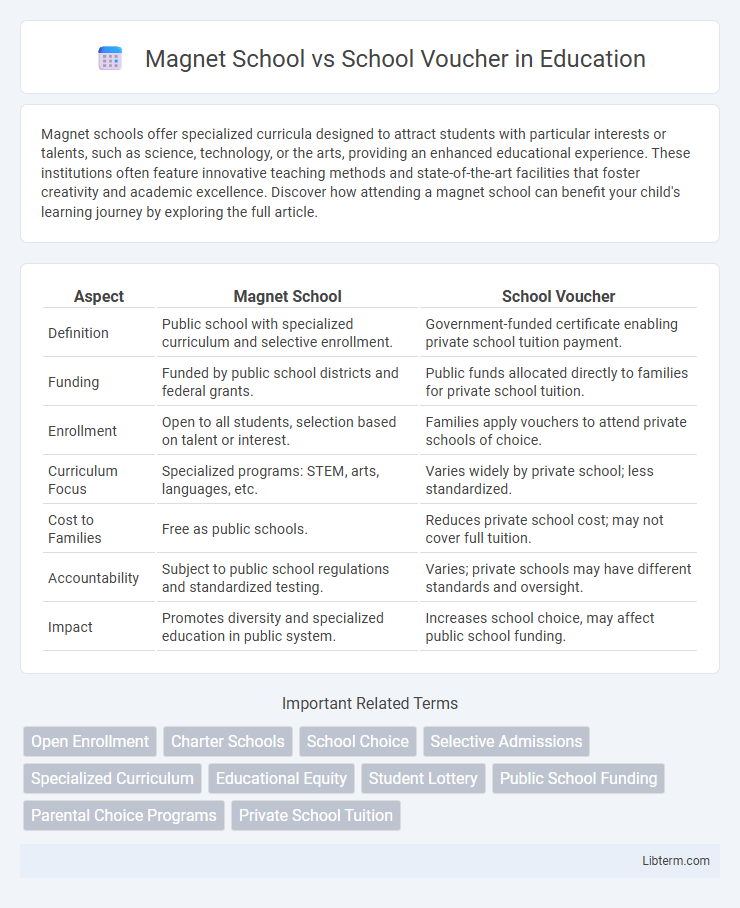Magnet schools offer specialized curricula designed to attract students with particular interests or talents, such as science, technology, or the arts, providing an enhanced educational experience. These institutions often feature innovative teaching methods and state-of-the-art facilities that foster creativity and academic excellence. Discover how attending a magnet school can benefit your child's learning journey by exploring the full article.
Table of Comparison
| Aspect | Magnet School | School Voucher |
|---|---|---|
| Definition | Public school with specialized curriculum and selective enrollment. | Government-funded certificate enabling private school tuition payment. |
| Funding | Funded by public school districts and federal grants. | Public funds allocated directly to families for private school tuition. |
| Enrollment | Open to all students, selection based on talent or interest. | Families apply vouchers to attend private schools of choice. |
| Curriculum Focus | Specialized programs: STEM, arts, languages, etc. | Varies widely by private school; less standardized. |
| Cost to Families | Free as public schools. | Reduces private school cost; may not cover full tuition. |
| Accountability | Subject to public school regulations and standardized testing. | Varies; private schools may have different standards and oversight. |
| Impact | Promotes diversity and specialized education in public system. | Increases school choice, may affect public school funding. |
Introduction to Magnet Schools and School Vouchers
Magnet schools are public institutions offering specialized curricula designed to attract a diverse student body interested in focused areas such as science, arts, or technology. School vouchers provide families with public funding to enroll their children in private schools, expanding educational choices beyond assigned districts. Both aim to improve educational outcomes but differ in structure, funding, and accessibility.
Defining Magnet Schools: Purpose and Principles
Magnet schools are public educational institutions designed to attract a diverse student body through specialized curricula focused on themes such as STEM, performing arts, or language immersion. Their purpose is to promote racial and socioeconomic integration, enhance academic excellence, and provide unique learning experiences beyond the standard district offerings. Magnet schools operate on principles of choice and innovation, often featuring competitive admissions and partnerships with local organizations to enrich student opportunities.
Understanding School Vouchers: How They Work
School vouchers are government-funded scholarships that allow parents to use public education funds to enroll their children in private schools, including religious and magnet schools. This system aims to increase school choice by providing families with financial flexibility beyond their assigned public schools. Critics argue vouchers can divert funds from public schools, potentially impacting their resources and quality.
Admissions Processes: Magnet Schools vs School Vouchers
Magnet schools typically use a selective admissions process based on academic performance, entrance exams, or specific talents, aiming to attract a diverse and high-achieving student body. In contrast, school voucher programs allow parents to choose private schools with fewer admission restrictions, often operating on a first-come, first-served basis or lottery systems when demand exceeds supply. This fundamental difference in admissions impacts student diversity, access equity, and the overall demographics of the participating schools.
Academic Performance and Outcomes Comparison
Magnet schools consistently demonstrate higher academic performance, often outperforming voucher-supported private schools in standardized test scores and graduation rates. Research indicates students in magnet programs benefit from specialized curricula and enriched educational environments, contributing to superior academic outcomes. In contrast, voucher schools show more variability in performance, with some struggling to match the rigorous standards and accountability measures evidenced in magnet schools.
Diversity and Inclusion: A Contrast
Magnet schools promote diversity and inclusion by offering specialized programs that attract students from various racial, ethnic, and socioeconomic backgrounds, creating a culturally rich learning environment. School vouchers enable families to choose private schools, which can sometimes lead to increased segregation as students may cluster into less diverse institutions. Research shows magnet schools generally support broader inclusivity through targeted recruitment and diverse curricula, while vouchers often lack mechanisms to ensure equitable access or maintain demographic balance.
Impact on Public School Funding
Magnet schools, funded by public education budgets, concentrate resources on specialized programs, often enhancing academic opportunities without redirecting core funds from traditional public schools. School vouchers, however, allocate public funds directly to parents for private school tuition, potentially reducing financial support for public schools by shifting enrollment and funding away. This diversion can lead to budget constraints in public schools, impacting staff, resources, and overall educational quality.
Parental Choice and Student Opportunities
Magnet schools offer specialized curricula and thematic programs that attract diverse student populations, providing enhanced educational opportunities tailored to student interests and talents. School voucher programs empower parents to choose private or alternative public schools by redirecting public funding, increasing access to varied learning environments beyond traditional district boundaries. Both mechanisms expand parental choice and student opportunities by promoting educational customization and competition.
Challenges and Criticisms of Each Model
Magnet schools face challenges related to limited enrollment capacity and potential socioeconomic segregation, often criticized for not fully addressing educational equity. School vouchers encounter opposition due to concerns over diverting public funds to private institutions and varying accountability standards, raising questions about resource allocation and educational quality. Both models struggle with ensuring equal access and maintaining consistent academic outcomes across diverse student populations.
Choosing the Best Option: Factors for Families
Families deciding between magnet schools and school vouchers should consider factors such as educational quality, specialized programs, and cost-effectiveness. Magnet schools offer themed curricula and diverse learning environments, while school vouchers provide flexibility in selecting private or alternative public schools. Evaluating academic performance, location proximity, and specific family needs ensures the best educational fit.
Magnet School Infographic

 libterm.com
libterm.com